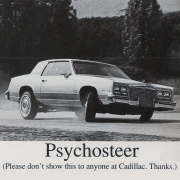|
Car dealers are not regulated by a professional body that requires them morally and legally to uphold the principles of compassion, service, altruism, and trustworthiness.
|
|
|
|

|
| # ? May 15, 2024 05:22 |
|
KingEup posted:Who is to blame when someone abuses their horsepower? The dealer who sold the car in the first place? Should the dealer have been more careful about who he sold the car to? Should he have interogated the buyer to see whether he/she had a history of abusing their horsepower? Surely a sane dealer would try to reduce the numbers of motor vehicles they sold so less people would abuse their horsepower. I wonder if there might be a difference betwen the relationship betwen a car salesman and customer and doctor and patient? Can you possibly think of any?
|
|
|
|
AAs are underperscribed for pain compared to other demographics. Do they have a similarly lower rate of abuse?
|
|
|
|
|
Albino Squirrel posted:See, this is my issue with your line of argument... citing old [from 2010 and 2012] data that states that iatrogenic drug addiction during treatment for pain is rare, when newer data (and, in my case, copious anecdotal experience) indicates that that is NOT TRUE. Where are your data? NEJM 2016: quote:addiction is not a predictable result of opioid prescribing. Addiction occurs in only a small percentage of persons who are exposed to opioids — even among those with preexisting vulnerabilities
|
|
|
|
Albino Squirrel posted:There's only one clinic routinely providing heroin-assisted treatment in North America to my knowledge, and that's in Vancouver. If you're talking about Insite they only provide safe, supervised injection, not drugs. It's still whatever the person brings in from the street. However it's still a hell of a lot safer for them when that Heroin they thought they were injecting turns out to be Fentanyl since they're now surrounded by nurses, doctors, and a pile of Naloxone.
|
|
|
|
KingEup posted:Who is to blame when someone abuses their horsepower? The dealer who sold the car in the first place? Should the dealer have been more careful about who he sold the car to? I don't remember which level of government did it, but we unironically made bartenders liable for drunks getting in accidents. Peddlers of drugs absolutely should draw the line for their users when they're unable to do it themselves. Mister Facetious fucked around with this message at 00:56 on Jan 29, 2017 |
|
|
|
Mr Luxury Yacht posted:If you're talking about Insite they only provide safe, supervised injection, not drugs. It's still whatever the person brings in from the street. And yes, physicians do have a responsibility to limit the risk that people become harmed by their prescriptions. That's... is that really up for debate?
|
|
|
|
I see much discussion based upon institutional failures in this thread. Yet I ask, and so too do Americans, why do folk become addicted to opaites? From what I hear, it is a moral failing: individuals who become addicts subjugate their will to devote themselves to our lord ADONAI to their addiction. What addicts could use more is god, and less loving enabling acts like needle exchanges or publicly financed criminal exchanges. More god = less addicts
|
|
|
|
That's kind of weak bait coming from you, MIGF.
|
|
|
|
Hydromorphone as replacement therapy is undesirable, due to its short half-life, in this methadone-maintained ex-junky's opinion. Sure, dillies offer a fantastic rush, but it lasts about as long as crack. ---- Also, iatrogenic addiction truly is a minor part of the opioid crisis. Certainly, doctors write for too many pills, but most of our addicts had a pre-existing disposition toward addiction, in my experience. This is facilitated by doctors, but it isn't the root issue. Like MIGF says, it's a moral failing. Just kidding. It's a combination of genetics, behavior and circumstance.
|
|
|
|
|
The_Book_Of_Harry posted:Hydromorphone as replacement therapy is undesirable, due to its short half-life, in this methadone-maintained ex-junky's opinion. Why can't you have both at the same time? Here is a video about a Swiss patient who gets diamorphine and methadone from the clinic: http://www.swissinfo.ch/eng/drug-treatment_-without-the-heroin-programme-i-d-probably-be-dead-/37819830
|
|
|
|
Eej posted:That's kind of weak bait coming from you, MIGF. He's just doing what Amergin (  ) used to do; copy pasting standard GOP talking points. ) used to do; copy pasting standard GOP talking points. It keeps the wits sharp, or you end up with a circle jerk chamber with everyone patting each other on the back. We won't win arguments with complacency and simply expecting the other side "to see the inherent correctness in our enlightened reason"; you gotta tear down their arguments and redouble yours. Mister Facetious fucked around with this message at 06:21 on Jan 29, 2017 |
|
|
KingEup posted:Why can't you have both at the same time? Huh? That article doesn't mention methadone, and hydromorphone isn't diamorphine. I'm fine with heroin replacement therapy as a tool for reducing harm, but alternatives like bupe and methadone are desirable for a person like me due to their lengthy half-lives. I can miss a clinic day without any fear of experiencing withdrawal symptoms...symptoms I'm likely to treat with street dope.
|
|
|
|
|
The_Book_Of_Harry posted:Huh? As I said, VIDEO. There is no reason you can't have both methadone and hydromorphone. As you can see from the VIDEO, there are patients already receiving bother methadone (long acting) and diamorphine (short acting) so there is no reason patients couldn't also take methadone and hydromorphone. KingEup fucked around with this message at 20:45 on Jan 29, 2017 |
|
|
|
Fair enough, the video shows that she does take a small amount of methadone, too. Im confused about how her dosing works, though. The article says she receives about half a gram of heroin daily, but the video shows her receiving 1/3 of that, alongside 10mg methadone (most maintenance prescriptions are between 60-100mg QD). One of the links has a doctor talking about twice daily dosing of heroin, but perhaps she goes three times a day? For someone like me, that's too great a time commitment, compared to methadone's minimal constraints. But to answer the question, why not both? A clinically-effective dose of methadone blunts the pleasurable effects of heroin (through cross-tolerance), and taking enough dope to override the methadone carries significant risk of overdose. Certainly, many people still use heroin while maintained on methadone, but most will acknowledge that "[they] only get sort-of high." Therefore, I'm choosing the methadone-only approach. Others do what they will.
|
|
|
|
|
The_Book_Of_Harry posted:Huh? Hydromorphone-/heroin-assisted treatment, and more generally safer injection sites, should be looked at as a transitional stage between street use and opioid substitution therapy. It might be a long-rear end transition, but the eventual goal is to get someone on the much better treatments that exist.
|
|
|
|
KingEup posted:Where are your data? The papers your citing give a 4-6% chance of addiction. That is "small". Edit: Also, it is no longer possible to simply continue previous practices with respect to the management of chronic pain. The associated risks of opioid diversion, overdose, and addiction demand change. Lote fucked around with this message at 00:48 on Jan 30, 2017 |
|
|
|
Yeah, sorry I didn't get around to doing an effortpost, not that it's a great loss or anything I just said I would and the weekend got away from me. If the rate of iatrogenic opiate addiction were just MEDIUM (in an absolute sense) then like 20% of the country would be addicted. There were a ton of opiate prescriptions. That's the main base-rate thing that KingEup is eliding with his evidence. People definitely get addicted in part for endogenous reasons, but there's a reason the rate blew up recently and it's not that mysterious and it was the opposite of a crackdown. And yeah, things are going to be bad for awhile regardless of what policy is. We've got ~2 million opiate addicts walking around. pangstrom fucked around with this message at 01:05 on Jan 30, 2017 |
|
|
|
Albino Squirrel posted:Oh, God, methadone and bupe are so much better for opioid dependence. If you really wanna get your life back on track that's the way to go. But not everyone does well on them, usually of they're not quite ready to give up the needle. (One of the inclusion criteria for NAOMI was having tried and failed methadone, for instance, which is about 50% of initial methadone scrips.) This is only tangentially related to your post, but one issue I had on suboxone that I always thought was strange is that one dose a day would not work well for me, and I had to split the dose and take half in the morning and half in the evening. I would begin to experience noticeable withdrawal symptoms by the evening if I took a dose in the morning (not terrible, but enough that I felt too bad to enjoy doing anything and wouldn't be able to sleep by that night). My doctor wouldn't believe me about this. I tried to convince myself it was psychological, but after trying to force myself to just take it once in the morning I realized it definitely wasn't. Do opioids (and other drugs I guess) affect different people for different amounts of time or something? Regarding suboxone in general, I feel like it's terrible how most people can't get it for a reasonable price. I was lucky enough to have good insurnace through my job that brought the cost to just $50-75 a month (for the medication itself, the doctor was $150/month). But I can't imagine someone working for minimum wage being able to spend like $500/month on suboxone.
|
|
|
|
has this thread discussed hypothetical agonist/antagonist mixtures as a way to mitigate risks of both dependence and overdose?
|
|
|
|
Ytlaya posted:This is only tangentially related to your post, but one issue I had on suboxone that I always thought was strange is that one dose a day would not work well for me, and I had to split the dose and take half in the morning and half in the evening. I would begin to experience noticeable withdrawal symptoms by the evening if I took a dose in the morning (not terrible, but enough that I felt too bad to enjoy doing anything and wouldn't be able to sleep by that night). My doctor wouldn't believe me about this. I tried to convince myself it was psychological, but after trying to force myself to just take it once in the morning I realized it definitely wasn't. With buprenorphine, the half life is generally 24 to 36 hours, but it can be more or less. More importantly, the analgesic window (where it kills pain) is a lot shorter than the window where it relieves cravings. If I use bupe for both pain and dependence I frequently split the dose into equal chunks every 8 hours.
|
|
|
|
The first thing you learn in pharmacology is never to speak in absolutes.
|
|
|
Ytlaya posted:This is only tangentially related to your post, but one issue I had on suboxone that I always thought was strange is that one dose a day would not work well for me, and I had to split the dose and take half in the morning and half in the evening. I would begin to experience noticeable withdrawal symptoms by the evening if I took a dose in the morning (not terrible, but enough that I felt too bad to enjoy doing anything and wouldn't be able to sleep by that night). My doctor wouldn't believe me about this. I tried to convince myself it was psychological, but after trying to force myself to just take it once in the morning I realized it definitely wasn't. Some people need split dosing, and my clinic accommodates those people, so long as their "peak and trough" test confirms abnormal rates of metabolization. Also $500 for opioid replacement is a bargain. If your habit is less than $20/day, you need detox, not maintenance.
|
|
|
|
|
Eej posted:The first thing you learn in pharmacology is never to speak in absolutes. Most sciences, really, but especially statistical ones.
|
|
|
|
Tim Raines IRL posted:has this thread discussed hypothetical agonist/antagonist mixtures as a way to mitigate risks of both dependence and overdose? https://forums.somethingawful.com/showthread.php?threadid=3760945&userid=0&perpage=40&pagenumber=17#post468790948
|
|
|
|
Eej posted:The first thing you learn in pharmacology is never to speak in absolutes. Only a Sith speaks in absolutes.
|
|
|
|
KingEup posted:Where are your data? I don't think this article tells us much at all. It's entirely too vague. They differentiate physical and psychological addiction, but never go on to clearly provide a definition of psychological addiction. They also seem to have a poor understanding of the history, since they make the claim that old version of the DSM overemphasize or equate physical and psychological addiction, when DSM-IV and DSM-V have very similar criteria that's just formatted differently. The exact sentence you quote about rates of addiction is just a random factoid they throw in without citation or evidence. As I mentioned above, they never even provide a definition for "addiction", so anything they say about epidemiology is meaningless. Regardless I do agree with the list of proposed solutions you posted before. Whether it's psychological addiction or physical dependence that's driving the current crises, we need to provide a safe environment to deescalate the overuse of opioids. Megasabin fucked around with this message at 05:01 on Jan 30, 2017 |
|
|
|
I would blow Dane Cook posted:Only
|
|
|
|
Megasabin posted:I don't think this article tells us much at all. It's entirely too vague. I love how a Cochrane review and the head of NIDA writing in the New England Journal of Medicine can be dismissed so easily. So far not one person has provided any evidence to the contrary. Are we arguing in good faith here or what?
|
|
|
|
KingEup posted:I love how a Cochrane review and the head of NIDA writing in the New England Journal of Medicine can be dismissed so easily. I'm going to turn that back around on you-- Are you arguing in good faith? I read the article in it's entirety, and gave you pointed criticism of the article's shortcomings with specific examples from the article itself. This is what I was trained to do in medical school, and is the same thing other physicians in this thread have been doing. Just because an article is from NEJM or Cochrane, does not mean it is perfect, and every article needs to be read and interpreted on an individual basis. Said article was not even a bad article, but the point you were trying to use it to make was questionable, given the lack of evidence for the quoted statement. I am attempting to engage you with the best intentions, which is why I read your article and thought about it before responding. You, on the other hand, seem to be demonstrating the modern day phenomena of "I have an article, therefore I am right". Just because your source is well known does not make it infallible. Are you willing to engage my criticism of the article or are you going to hand wave it?
|
|
|
|
Megasabin posted:Just because an article is from NEJM or Cochrane, does not mean it is perfect, and every article needs to be read and interpreted on an individual basis. Your'e right, it doesn't mean it's perfect. All scientific knowledge is incomplete. I'm not, however, going to dismiss the findings from a goddamn Cochrane review and reject the opinion of the head of NIDA (which reflects these findings) because Megasabin posted a 100 word critique. Show me data that says iatrogenic addiction is the the norm. KingEup fucked around with this message at 08:02 on Jan 30, 2017 |
|
|
|
KingEup posted:I love how a Cochrane review and the head of NIDA writing in the New England Journal of Medicine can be dismissed so easily. I'm not providing new evidence because I'm quoting the papers that you're citing. This quote, "It is no longer possible to simply continue previous practices with respect to the management of chronic pain. The associated risks of opioid diversion, overdose, and addiction demand change." is from the paper that you're using to argue the opposite conclusion.
|
|
|
|
Lote posted:I'm not providing new evidence because I'm quoting the papers that you're citing. Most of the people who end up dead or addicted are using pills prescribed for someone else. Iatrogenic addiction is not the problem. People are gettng into trouble when they are taking opioids for non medical reasons, opioids which they have sourced from somewhere else. It does demand change to ensure that the people who take opioids for non-medical reasons dn't suffer the kinds of harm that they have been. KingEup fucked around with this message at 16:37 on Jan 30, 2017 |
|
|
|
KingEup posted:Most of the people who end up dead or addicted are using pills prescribed for someone else. This is not iatrogenic addiction. Presumably if the original patient has sufficient lack of need for them that they are making their way into other people's hands that still indicates a problem with overprescription.
|
|
|
|
Another paragraph from the intro of the article:quote:However, two major facts can no longer be questioned. First, opioid analgesics are widely diverted and improperly used, and the widespread use of the drugs has resulted in a national epidemic of opioid overdose deaths and addictions. More than a third (37%) of the 44,000 drug-overdose deaths that were reported in 2013 (the most recent year for which estimates are available) were attributable to pharmaceutical opioids; heroin accounted for an additional 19%. At the same time, there has been a parallel increase in the rate of opioid addiction, affecting approximately 2.5 million adults in 2014.9 Second, the major source of diverted opioids is physician prescriptions.10,11 For these reasons, physicians and medical associations have begun questioning prescribing practices for opioids, particularly as they relate to the management of chronic pain. Moreover, many physicians admit that they are not confident about how to prescribe opioids safely,12 how to detect abuse or emerging addiction, or even how to discuss these issues with their patients.13 KingEup you're locked in on this narrative that isn't true and even without the redtext you have the smell of somebody who either can't or won't think straight about anything, only gets worse with increased "expertise", and is totally fine with scorched earth debating and goalpost shifting. It's hard to tell how much of it was iatrogenic versus diverted, but in the context of pill mills those sources are basically the same thing. Both are "availability". And, ultimately, the "how did we get here" isn't the same question as the "how do we fix it", where people to varying extents will agree with you. I'm not super interested in hearing your thoughts on that topic, either, to be clear, but at least we don't have to spend time on sky-is-blue stuff.
|
|
|
|
OwlFancier posted:Presumably if the original patient has sufficient lack of need for them that they are making their way into other people's hands that still indicates a problem with overprescription. Not necessarily. Imagine for instance a pain patient living off of disability who sells some of his pills on the black market so he can afford to pay rent and bills. The prescription may be perfectly responsible given the severity of his pain but as long as he needs an extra source of income to survive and as long as those pills fetch a high price on the black market, diversion is going to continue to be a problem. Or think of an old cancer patient whose junky/dealer grandson or caretaker steals some of her pills and replaces them with Advils. Then of course there's always robbery, though I doubt that accounts for as much diversion as the former two scenarios.
|
|
|
|
FreshlyShaven posted:Not necessarily. Imagine for instance a pain patient living off of disability who sells some of his pills on the black market so he can afford to pay rent and bills. The prescription may be perfectly responsible given the severity of his pain but as long as he needs an extra source of income to survive and as long as those pills fetch a high price on the black market, diversion is going to continue to be a problem. Or think of an old cancer patient whose junky/dealer grandson or caretaker steals some of her pills and replaces them with Advils. Then of course there's always robbery, though I doubt that accounts for as much diversion as the former two scenarios. Not necessarily in all cases no, my grandmother was in broadly the former case though she didn't sell any of her excess as much as hoard them in case she wanted to kill herself. But from what I understand with American prescribing habits, a large portion of cases are doctors prescribing hideously strong opiates to take home for everything. For things that you would be told to take over the counter paracetamol or be kept in hospital for in the UK.
|
|
|
|
pangstrom posted:Another paragraph from the intro of the article: Yes, diversion and subsequent 'improper' use is common. I don't dispute that. I dispute the idea that people who take opioids which have been prescribed for them are at any serious risk of iatrogenic addiction. I also dispute the policy response to reign in opioid prescriptions, encourage the switch to abuse deterrant formulations as well as the belief that prescription monitoring programs work. I take issue with the effectiveness of supply side drug interventions in general. When have they ever reduced harm?
|
|
|
|
Well, if we could go back in time to the mid 90s and change prescribing guidelines on opiates, or strangle oxycontin in the crib, or something similar along these lines, well that would have decreased a lot of harm!
pangstrom fucked around with this message at 20:30 on Jan 30, 2017 |
|
|
|

|
| # ? May 15, 2024 05:22 |
|
FreshlyShaven posted:Not necessarily. Imagine for instance a pain patient living off of disability who sells some of his pills on the black market so he can afford to pay rent and bills. The prescription may be perfectly responsible given the severity of his pain but as long as he needs an extra source of income to survive and as long as those pills fetch a high price on the black market, diversion is going to continue to be a problem. I think you meant to say: as long as there is poverty and good healh care is inaccessible to a large segment of the population then diversion is still going to happen.
|
|
|





















